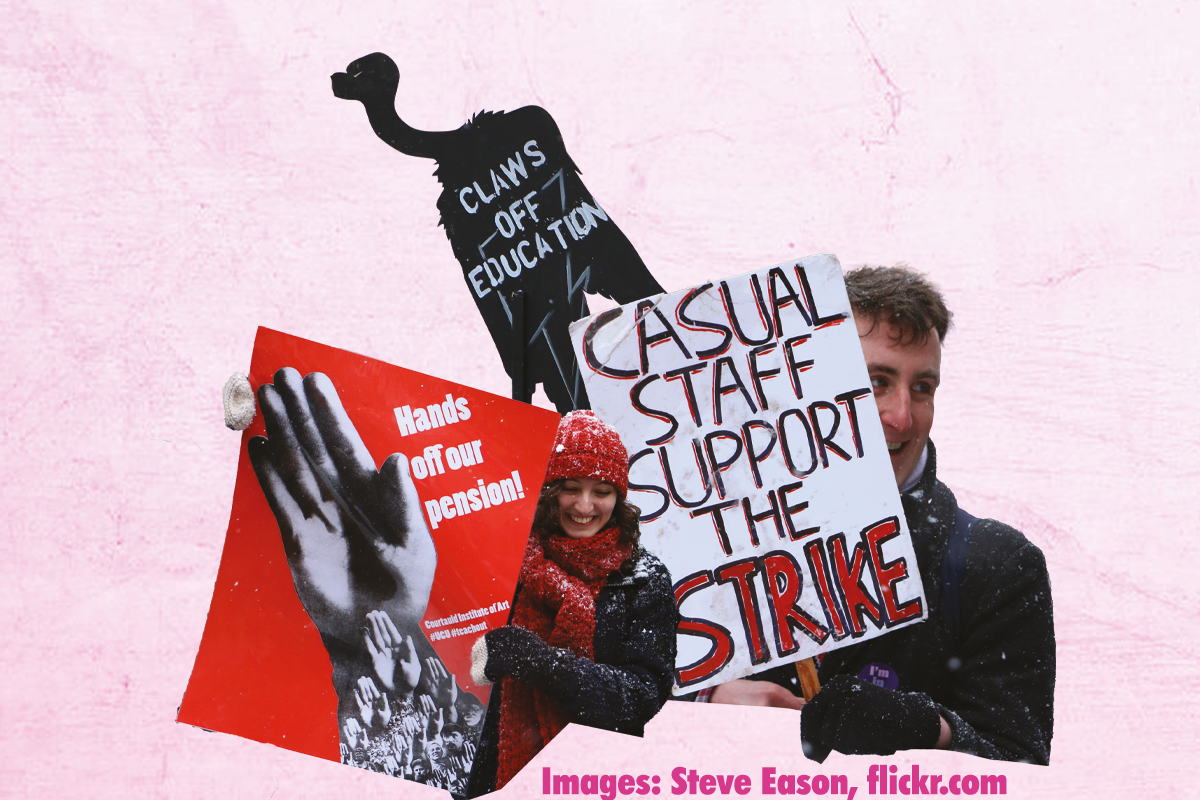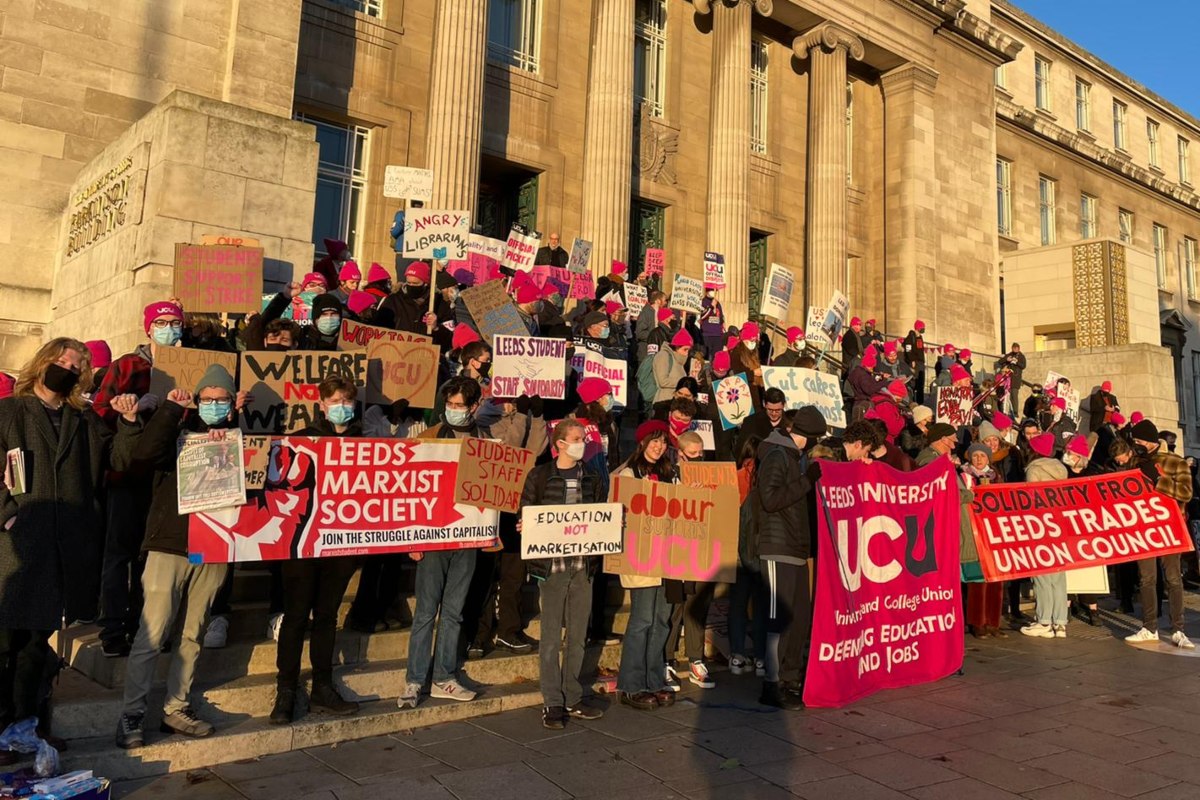Support staff at Leeds University, organised in Unison, are on strike this week, fighting for decent pay. This is one of many struggles taking place on UK campuses, as workers and students mobilise against the marketisation of education.
After 12 years of below-inflation pay, higher education (HE) staff organised in Unison are at breaking point. The bosses – in collaboration with university bureaucrats – are stopping at nothing to protect their profits and push down wages.
As one worker organised in Unison at the University of Leeds told Socialist Appeal: “When you have a full-time job, you shouldn’t have to sit at home without the heating on, while your vice chancellor is on a six-figure salary.”
The money is clearly there to pay staff a decent wage – it is simply in the wrong hands. The University of Leeds has £700 million in reserves, for example. But this is either being hoarded, or is spent on flashy new buildings.
“Members are telling us they can’t afford to live on their wages,” stated Leeds University Unison Branch secretary Angela Blackburn. “They’re having to get second jobs, cut back on necessities and use food banks…This is unprecedented.”
Preparing for action
But university workers are not rolling over. Rather, they are fighting back.
From 20-24 June, members of Leeds University Unison will be taking strike action to fight for an above-inflation pay rise. And unless the bosses come back with an improved offer, they will likely be hit by more action, as the branch is preparing for another ballot in July.
Jonny from @UnisonMarxists speaks on the picket line about the privatisation and attacks on workers’ pay and conditions, which are a product of the capitalist crisis pic.twitter.com/ovNrgAx5Oc
— UNISON Marxists (@UnisonMarxists) June 20, 2022
The University of Leeds branch has been one of eight HE branches that have led the way with this militant action, fighting against last year’s pathetic 1.5% pay offer.
Now, the results of a recent national consultative ballot on this year’s 3% pay offer reveal that 83% of members across the UK want to reject this offer, and move to a ballot for industrial action.
This could potentially shut down university campuses at the start of the next academic year, as the union has indicated that any action taken will be from 19 September.
Campus unions: unite!

Elsewhere, other unions representing non-academic university staff are also fighting back.
At the London School for Hygiene and Tropical Medicine (LSHTM), workers organised in the Independent Workers of Great Britain (IWGB) union are waging a struggle against low pay.
These workers have faced victimisation in response to their campaigning efforts, with a number of their members now effectively blacklisted from ever being brought onto in-house contracts.
Another campaign is underway against outsourcing at nearby University College London, also led by the IWGB. Meanwhile, two campaigns by Unite members at the University of Cambridge – against outsourcing and for better pay – continue on.
These workers face the same issues: falling real wages; unequal pay across gender and ethnicity; and brutal conditions, due to jobs and services being outsourced to big multinationals.
As such, the fightback must be united, with campus unions coordinating nationally to take on university bosses. Unison should take a lead on this, as the largest of the unions organising non-academic staff, and as the union with the most resources.
Importantly, these unions could provide a much-need injection of energy and militancy into the national dispute of academic staff in the UCU, which – due to poor leadership – is currently seeing a disorganised, although temporary, retreat by the union and its members.
Success and momentum behind these other campaigns could see the tables turn in the favour of more militant rank-and-file layers within the UCU, who are crying out for a renewed struggle against university bosses.
For staff-student control

In 2010, universities had their funding cut, and were told to make money by other means. They were subsequently opened up to private investors, looking to turn a profit from HE.
Tuition fees increased to a whopping £9,250 per year. Meanwhile, in the same period, university staff have faced a 20% pay reduction, when adjusted for inflation.
The marketisation of education is the direct consequence of capitalism. Rather than invest in staff and decent services for students, university management are more concerned with turning a profit.
As such, the fight on campus for improved pay and against outsourcing should be turned into a fight against unelected and unaccountable bureaucrats, and for universities free from profit.
Instead, educational institutions should be run by the staff and students who really make them what they are.
This should include the huge reserves and wealth held by universities, which should be under the control of staff and students, used to provide vital services such as mental health support; to expand departments; and to bring in temporary, precarious staff – such as those in marking support – onto permanent, well-paid contracts.
To help fund this, outsourcing companies that act like parasites on the education system should also be brought under public ownership and workers’ control, without compensation.
This is the programme that higher education unions should be fighting for, in coordination with the student movement, to raise the sights of workers and youth to the need for a socialist education system.






